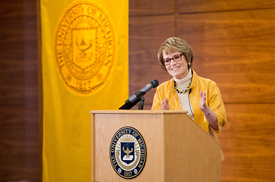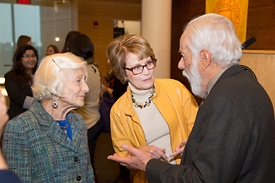Related stories:
President Mary Sue Coleman announced new key initiatives to boost performing arts education, Great Lakes sustainability efforts and health care policy research at her annual Leadership Breakfast Oct. 30 at the Stephen M. Ross School of Business.
Coleman said she continues to be energized by the life-changing work of the institution, and the contributions of leaders at all three campuses.
“The University of Michigan is indeed an inspiring place. And that is because of the ideas, discoveries and service of our students, staff and faculty,” she said.
Among the new initiatives she announced were:
• The creation of a new Presidential Innovation Award in which the Provost’s Office will recognize with cash awards creative staff contributions that make Michigan a better place to live and work.
• The establishment of a $9 million U-M Water Center. Its focus would be four critical areas related to Great Lakes region sustainability: reducing toxic contamination, fighting invasive species, protecting wildlife habitat, and promoting the health of the coastlines. It is supported by a $4.5 million gift from the Fred A. and Barbara M. Erb Family Foundation.


President Mary Sue Coleman announces the creation of a Presidential Innovation Award among other new initiatives. Below, Coleman greets retired U-M faculty Irene Butter and Andrew Nagy, both Holocaust survivors and longtime supporters of U-M’s Wallenberg Medal and Lecture. Photos by Scott C. Soderberg, Michigan Photography.
• A transformative project to renovate and expand the Earl V. Moore Building, home of the School of Music, Theatre & Dance. It is sparked by an $8 million contribution from longtime Michigan donors William and Delores Brehm. Coleman said Board of Regents approval would be sought in November for the $23 million project. The university would provide $14 million and additional support will be sought from alumni and friends.
• The hiring of Dr. John Ayanian from Harvard University as director of the new Institute for Healthcare Policy and Innovation, based at the North Campus Research Complex. “We believe the institute will be the largest in the country for health care policy researchers,” Coleman said.
• The creation of a Raoul Wallenberg Fellowship for undergraduates. A $25,000 stipend will be awarded to a graduating senior who demonstrates a deep commitment to selfless work, starting with a graduating senior from 2013. Wallenberg earned a degree in architecture in 1935. As a Swedish diplomat, he is credited with saving 100,000 lives during the Holocaust. This year is the centennial of Wallenberg’s birth.
“I can think of no more important occasion to dedicate our work as a university to the values he lived. He loved to learn, he had an appetite for adventure, and he embraced new people and different places. He showed us, more than any Michigan graduate, that one person can make a difference,” she said.
Coleman also recognized current members of the U-M community who inspire. They included student Jasmine Injejikian, who is leading this year’s Dance Marathon to raise thousands for children with disabilities; staff member Dan Rife, an engineer who combines new technologies with human expertise to conserve energy throughout campus buildings; and Michael Boehnke, a statistical geneticist in the School of Public Health who is gaining insights into the heredity of diabetes, bipolar disorder and other debilitating diseases.
Coleman said LSA would launch a new theme semester called “Understanding Race” in January. She said U-M’s legacy of inclusion and leadership brings with it a deep responsibility to live out our values.
“It is an important example of just how critical it is for us to think substantively about race and identity and to encourage a thoughtful dialogue about these issues,” she said.
Coleman recognized four deans in the final year of their leadership tenures: Terrence J. McDonald of LSA, Evan Caminker of the Law School, Peter Polverini of the School of Dentistry, and Paul N. Courant of University Libraries, saying they “have carried out extraordinary work in one of the university’s most fiscally challenging eras.” She also acknowledged Francis Blouin, stepping down as the longest-serving director of the Bentley Historical Library, to devote himself full time to teaching, starting next fall.
Coleman also recognized two retired faculty members who as teens survived the Holocaust, Irene Butter and Andrew Nagy. Both are longtime Wallenberg Executive Committee members, helping to guide The Wallenberg Lecture and Medal at U-M. Nagy was sheltered in one of Wallenberg’s “safe houses” in Budapest in 1944.
“Wallenberg went to places and pulled people off the trains, he was negotiating with the head of the German SS, he did everything he could possibly do, ignoring his personal safety. His story needs to be continuously told and remembered. He demonstrates that one person can make a big, big difference,” Nagy said.
Butter said one reason she is committed to keeping attention focused on Wallenberg is because someone from Sweden, Wallenberg’s native country, helped arrange for the fake Ecuadorian passport that allowed her to flee the Bergen-Belsen concentration camp to safety during World War II.
“This university had a role in what Wallenberg became. He said one should never be a bystander,” she said.
Noting that Wallenberg, as a U-M student, “absolutely relished new people and different cultures,” Coleman said pursuing more research, more service and more collaboration means being more global.
She said U-M leads the nation in Fulbright grants, which support global study. The president said her recent trip to Brazil provides fertile territory for collaborations and partnerships, adding she will lead a faculty delegation to India next year. Meanwhile, the university is partnering with universities in China, Ghana and South Africa.
“It’s why we, as an institution, are communicating in Spanish, Portuguese and Mandarin. We’ve joined Weibo, China’s version of Twitter, and are now considered the most influential American university in that space,” she said.
Coleman also said U-M is the first university to lead an entire satellite launch program, a $152 million venture to better understand hurricanes.
“It was very inspirational, the underlying message of what can we do with what we learn at Michigan,” said Paul Lee, a professor in the Medical School who listened to the president’s talk. “I liked hearing about what Raoul Wallenberg took from his experiences and how it helped make him who he was. That’s the goal of what we are trying to do at the university, to make the world a better place.”

